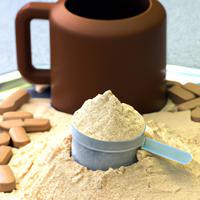
1 serving (30 grams) contains 120 calories, 24.0 grams of protein, 1.0 grams of fat, and 2.0 grams of carbohydrates.

Log this food in SnapCalorie

Nutrition Information
Calories |
960 | ||
|---|---|---|---|
% Daily Value* |
|||
| Total Fat | 8.0 g | 10% | |
| Saturated Fat | 4.0 g | 20% | |
| Polyunsaturated Fat | 0 g | ||
| Cholesterol | 80.0 mg | 26% | |
| Sodium | 400.0 mg | 17% | |
| Total Carbohydrates | 16.0 g | 5% | |
| Dietary Fiber | 0 g | 0% | |
| Sugars | 8.0 g | ||
| protein | 192 g | 384% | |
| Vitamin D | 0 mcg | 0% | |
| Calcium | 800.0 mg | 61% | |
| Iron | 4.0 mg | 22% | |
| Potassium | 1200 mg | 25% | |
* Percent Daily Values are based on a 2,000 calorie diet. Your daily values may be higher or lower depending on your calorie needs.
Food Attributes
Source of Calories
About Whey proein powder
Whey protein powder is a high-quality protein supplement derived from milk during cheese production. It's rich in essential amino acids, particularly leucine, which supports muscle growth and recovery, making it a popular choice for athletes and fitness enthusiasts. This versatile powder has a neutral taste, making it easy to incorporate into smoothies, shakes, or baked goods. Originating from dairy products, it's a staple in modern nutrition worldwide. Whey protein is low in fat and carbohydrates but offers a concentrated protein source. It may boost metabolism, aid weight management, and promote satiety. However, individuals with lactose intolerance or dairy allergies should choose lactose-free or plant-based alternatives. Always check labels for added sugars or artificial ingredients. Whether for post-workout recovery or supplementing daily protein intake, whey protein is a convenient, nutrient-dense option to support an active lifestyle.



